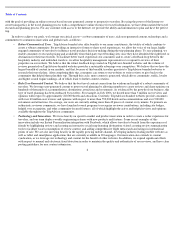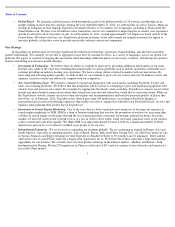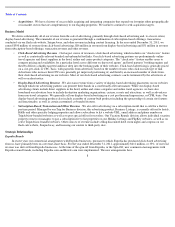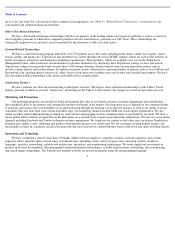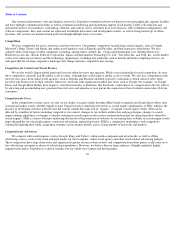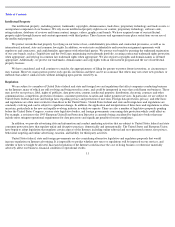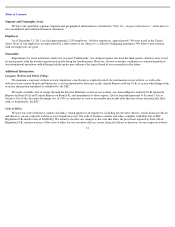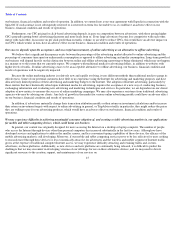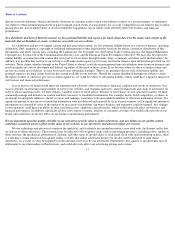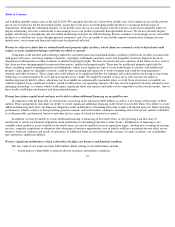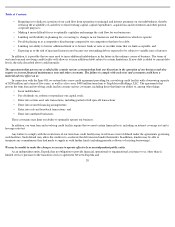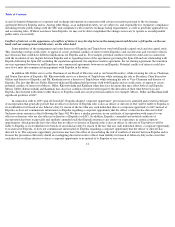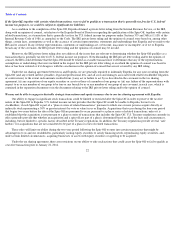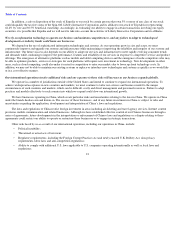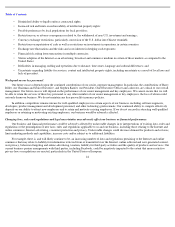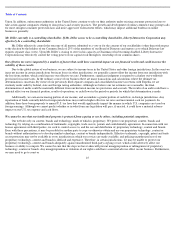TripAdvisor 2011 Annual Report Download - page 20
Download and view the complete annual report
Please find page 20 of the 2011 TripAdvisor annual report below. You can navigate through the pages in the report by either clicking on the pages listed below, or by using the keyword search tool below to find specific information within the annual report.
Table of Contents
such devices. To the extent that revenue generated from advertising placed on mobile and tablet computing devices becomes more important to
our business and we fail to adequately evolve and address this market, our business and financial performance could be negatively impacted.
We rely on the value of our brand and consumer trust in our brand, and the costs of maintaining and enhancing brand awareness are
increasing.
We invest in our brand in order to retain and expand our customer base and expect these investments to continue, or even increase, as a
result of a variety of factors, including increased spending from competitors, the increasing costs of supporting multiple brands, expansion into
geographies and products where our brands are less well known, inflation in media pricing, including SEM keywords, and the continued
emergence and relative traffic share growth of search engines and metasearch engines as destination sites for travelers. We expect to continue to
invest in, and devote resources to, advertising and marketing, as well as other brand building efforts to preserve and enhance consumer
awareness of our brands. Such efforts may not maintain or enhance consumer awareness of our brands, and, even if we are successful in our
branding efforts, such efforts may not be cost-effective, or as efficient as they have been historically. If we are unable to maintain or enhance
consumer awareness of our brands or to generate demand in a cost-effective manner, it would have a material adverse effect on our business and
financial performance.
We face competition from companies and websites that collect travel-related content, which could divert traffic from our websites causing
financial harm to us.
We may face increased competition to the extent that competitors pursue a strategy to maximize the creation of commercially valuable
online content at significant scale. For example, if any of the large search engines or online travel agencies chose to compete more directly with
us in the travel review space, we may face loss of business or other adverse financial consequences since those entities generally possess
significantly greater consumer bases, financial resources, distribution channels and patent portfolios. For example, Google Places, with its
aggregated reviews and local recommendations, competes with us. Further, Google’s access to more comprehensive data regarding user search
queries through its search algorithms gives it a significant competitive advantage over other companies in the industry, including us. If this data
is used competitively by Google, sold to online publishers or given away for free, our business may face increased competition from companies,
including Google, with substantially greater resources, brand recognition and established market presence. We could also face competition from
online travel agents that may be in a position to accumulate and develop a comprehensive offering of travel-related reviews and resources. The
barriers to entry for these companies may be limited given their access to travel-related information and relationships with consumers. If online
travel agents were to more aggressively pursue our market, the number of visitors to our websites may be negatively affected, which would, in
turn, negatively impact our community and ability to collect content and also to reduce our ability to attract advertisers. Online travel agents are
also a meaningful source of revenue for us, so if in competing with us, these companies decide to reduce or eliminate their business with us, and
it could significantly impact our results of operations and financial condition. Any of these competitors may announce new products, services or
enhancements that attract users.
Many of our competitors have significantly greater financial, technical, marketing and other resources compared to us as well as large
client bases. In addition, we compete with newspapers, magazines and other traditional media companies that provide offline and online
advertising opportunities. We expect to face additional competition as other established and emerging companies enter the travel advertising
market. Competition could result in higher traffic acquisition costs, reduced margins on our advertising services, loss of market share, reduced
customer traffic to our websites and reduced advertising by travel companies on our websites. For example, Google (through its launch of
Google Hotel Finder, acquisition of ITA Software, evolution and expansion of Google Places and preferred top placement of Places results in
Google organic travel search results) and Microsoft’s Bing (through its launch of Bing Travel) have each taken steps to appeal more
16


